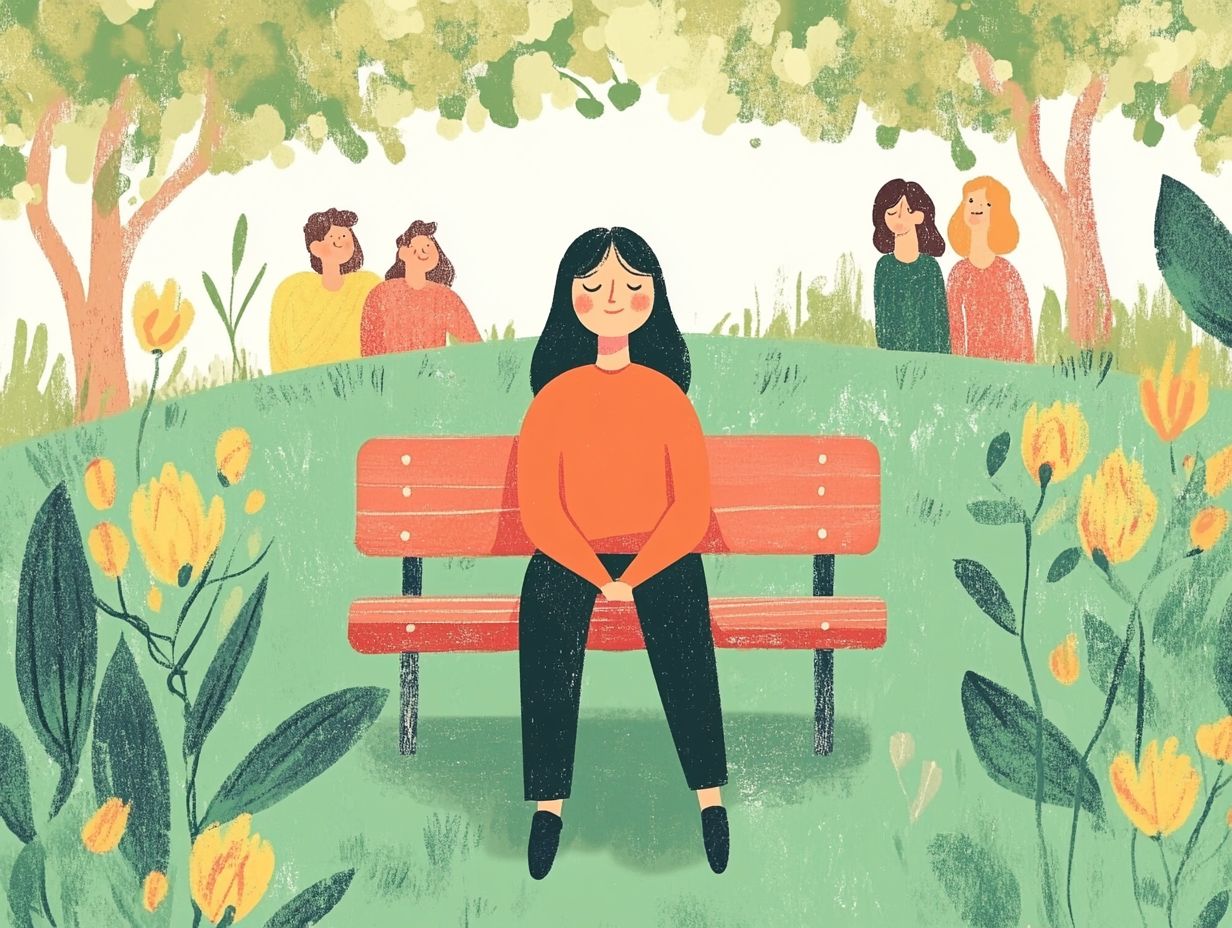The Psychological Benefits of Gratitude
Gratitude goes beyond simple politeness it’s a powerful tool that can reshape your mindset and boost your well-being.
This article explores the essence of gratitude, revealing its mental health benefits, such as reduced stress and stronger relationships.
You’ll find practical strategies for cultivating gratitude in your daily life and tips for overcoming common challenges.
Embracing gratitude may be the key to a happier, more fulfilling life.
Contents
- Key Takeaways:
- The Power of Gratitude
- Psychological Benefits of Practicing Gratitude
- Ways to Cultivate Gratitude
- Overcoming Challenges in Practicing Gratitude
- Frequently Asked Questions
- What are the psychological benefits of gratitude?
- How does gratitude impact our relationships?
- Can practicing gratitude improve our mental health?
- Do we have to be grateful for big things to experience the benefits?
- How can we incorporate gratitude into our daily lives?
- Can gratitude have a lasting effect?
Key Takeaways:

- Practicing gratitude improves mental health by promoting positive emotions.
- Expressing gratitude reduces stress and enhances overall well-being.
- Cultivating gratitude strengthens relationships and fosters empathy.
The Power of Gratitude
The power of gratitude extends beyond simple appreciation; it acts as a catalyst for enhancing emotional health and life satisfaction, especially during tough times like the COVID-19 pandemic.
By keeping a gratitude journal, you can develop a grateful mindset that fosters positive emotions and deepens your connections with others, leading to greater happiness.
Experts such as Dani Moye and Nathan Brandon emphasize the mental health benefits of expressing gratitude, particularly its role in reducing stress and boosting emotional intelligence.
Understanding the Concept of Gratitude
Understanding gratitude is vital for unlocking its many psychological benefits. It involves both being thankful and nurturing emotional health.
This complex emotion includes recognizing the kindness of others and appreciating the positives in your life, no matter how small.
Gratitude goes beyond fleeting feelings; it requires acknowledgment, reflection, and regular practice. Activities like keeping a gratitude journal can help you document your experiences and emotions each day.
This practice encourages a positive mindset, leading to better well-being, resilience against stress, and increased life satisfaction.
By embracing gratitude, you can create a supportive environment rich in positive emotions, enhancing your mental health.
Psychological Benefits of Practicing Gratitude
Start practicing gratitude today! It can dramatically boost your happiness and mental health.
This simple yet impactful habit not only reduces stress but also enhances your overall happiness and strengthens relationships.
Improved Mental Health
Embracing gratitude is powerful for improving mental health. Research shows that those who regularly express gratitude experience higher levels of positive emotions and better mental health.
This practice nurtures a positive mindset and builds resilience when facing life s challenges. Keeping a gratitude journal provides a space for reflection and appreciation.
Studies indicate that documenting gratitude can reduce symptoms of anxiety and depression, leading to a more balanced emotional state.
By acknowledging daily joys and recognizing the support of others, you can forge deeper connections, enhancing overall life satisfaction and mental clarity.
Stress Reduction

Gratitude plays a pivotal role in reducing stress, allowing you to shift your focus from negative emotions to the positive aspects of your life.
By consciously recognizing and appreciating the good whether it’s supportive relationships or personal achievements you can experience a significant psychological shift that enhances your emotional health.
This practice not only fosters a more optimistic outlook but also gives you the power to manage stress more effectively.
For instance, keeping a gratitude journal, where you reflect on daily blessings, helps you cultivate mindfulness and reinforces positive emotional states.
Engaging in such practices creates a buffer against the pressures of daily life, ultimately leading to improved mental well-being and greater resilience in the face of challenges.
Enhanced Relationships
Enhanced relationships stand out as one of the remarkable benefits of gratitude. When you express appreciation, it strengthens your connections and elevates your overall satisfaction in life.
By embracing gratitude practices like journaling about your daily blessings or performing acts of kindness you often find that your emotional bonds with peers and loved ones deepen significantly.
These practices can lead to richer social interactions, fostering empathy and understanding, which are essential for nurturing healthy relationships.
As you acknowledge and express your appreciation for those around you, you cultivate an atmosphere filled with positivity and mutual support. This cycle of gratitude not only boosts your emotional well-being but also reinforces your interpersonal connections, making it easier for you to navigate challenges and cultivate a true sense of belonging.
Ways to Cultivate Gratitude
Cultivating gratitude encompasses a variety of strategies and practices that can profoundly elevate your emotional health and foster mental well-being.
One of the most effective tools at your disposal is a gratitude journal, which can serve as a powerful spark for positive change in your life.
Imagine the joy that can unfold when you make gratitude a daily habit!
Incorporating Gratitude into Daily Life
Incorporating gratitude into your daily life can be achieved effortlessly through consistent practices, such as maintaining a gratitude journal where you can reflect on the things you are thankful for. This daily ritual not only fosters a positive mindset; it also encourages you to pause and recognize the small joys that often slip through the cracks of a busy day.
Consider this: after a hectic day, instead of simply unpacking the day’s stress, take a moment to jot down three things that made you smile perhaps a warm cup of coffee or a friendly chat with a colleague. Sharing these moments of appreciation with friends or family not only deepens your connections but also inspires them to reflect on their own experiences.
These simple actions help cultivate a habit of recognition, transforming gratitude into a natural part of your everyday life.
Practicing Gratitude Exercises
Practicing gratitude exercises is a powerful way for you to tap into the psychological benefits of gratitude, fostering your personal growth and enriching your emotional health.
By incorporating simple activities like keeping a daily gratitude journal, writing thank-you notes, or engaging in guided gratitude meditation, you can cultivate a deeper appreciation for the positive aspects of your life.
Practicing gratitude encourages mindfulness, allowing you to shift your focus away from negative thoughts and ultimately enhancing your emotional well-being.
Don’t miss out on the chance to transform your life! Setting aside just a few moments each day to reflect on what you re thankful for can create a positive ripple effect, influencing your mental resilience and enriching your personal relationships.
Overcoming Challenges in Practicing Gratitude

Overcoming challenges in practicing gratitude is vital for you to fully enjoy its benefits, particularly when you encounter negative thoughts and find it difficult to consistently express appreciation.
Embracing this journey will elevate your experience and foster a deeper sense of fulfillment in your life.
Dealing with Negative Thoughts
You can take charge of your thoughts right now! Dealing with negative thoughts is essential to nurturing your gratitude practice. These thoughts can significantly impede your emotional well-being and diminish the psychological benefits that gratitude offers.
Acknowledge your negative feelings instead of suppressing them. This awareness paves the way for a deeper understanding of your emotions.
Consider incorporating techniques like journaling. Writing down both your negative thoughts and the moments of gratitude that counter them can help foster a more balanced perspective.
Engaging in mindfulness through meditation allows you to observe these negative thoughts without judgment, promoting a sense of acceptance.
By using these strategies, you can enhance your overall mental health, leading to improved emotional resilience and a richer appreciation for the everyday blessings surrounding you.
Maintaining Consistency
Maintaining consistency in practicing gratitude is essential for enjoying its benefits. This allows the positive effects on both mental and emotional health to accumulate over time.
Regular gratitude exercises help develop a more positive mindset and establish a sustainable habit that can lead to lasting changes in your overall well-being.
One effective method is to keep a gratitude journal. Jot down daily reflections on what you appreciate in your life. This practice reinforces your focus on the positive aspects and builds resilience against stress.
Incorporating reminders or daily rituals, like sharing moments of gratitude with a friend or family member, can further strengthen your commitment.
Exploring various methods such as writing gratitude letters or engaging in visualization exercises allows you to personalize your practice, keeping it fresh and engaging.
Frequently Asked Questions
What are the psychological benefits of gratitude?
Expressing gratitude has been found to improve overall psychological well-being by increasing positive emotions, reducing stress and anxiety, and promoting resilience and self-esteem.
How does gratitude impact our relationships?

Gratitude can strengthen relationships by fostering feelings of closeness, empathy, and trust. It encourages acts of kindness and reciprocity, leading to more fulfilling and satisfying relationships.
Can practicing gratitude improve our mental health?
Yes, research shows that gratitude can be an effective tool for managing and improving mental health. It can help reduce symptoms of depression and anxiety while increasing overall life satisfaction.
Do we have to be grateful for big things to experience the benefits?
No, expressing gratitude for even the small things in life can significantly impact our mental well-being. It’s the act of acknowledging and appreciating the good in our lives that matters.
How can we incorporate gratitude into our daily lives?
There are many ways to practice gratitude:
- Keep a gratitude journal.
- Express gratitude in daily conversations.
- Set aside time to reflect on what you are grateful for.
Find a method that works for you and make it a habit.
Can gratitude have a lasting effect?
Yes, regular practice of gratitude can lead to long-term changes in our brain and behavior. It helps us cultivate a more positive mindset and outlook on life, leading to sustained psychological benefits.
Start your gratitude journal today and feel the difference!






